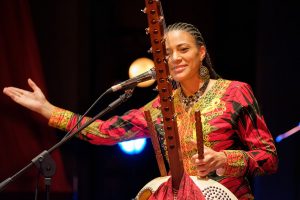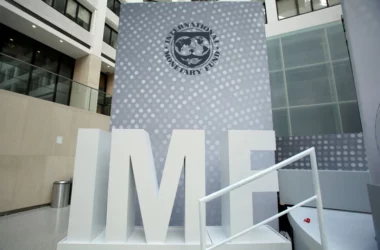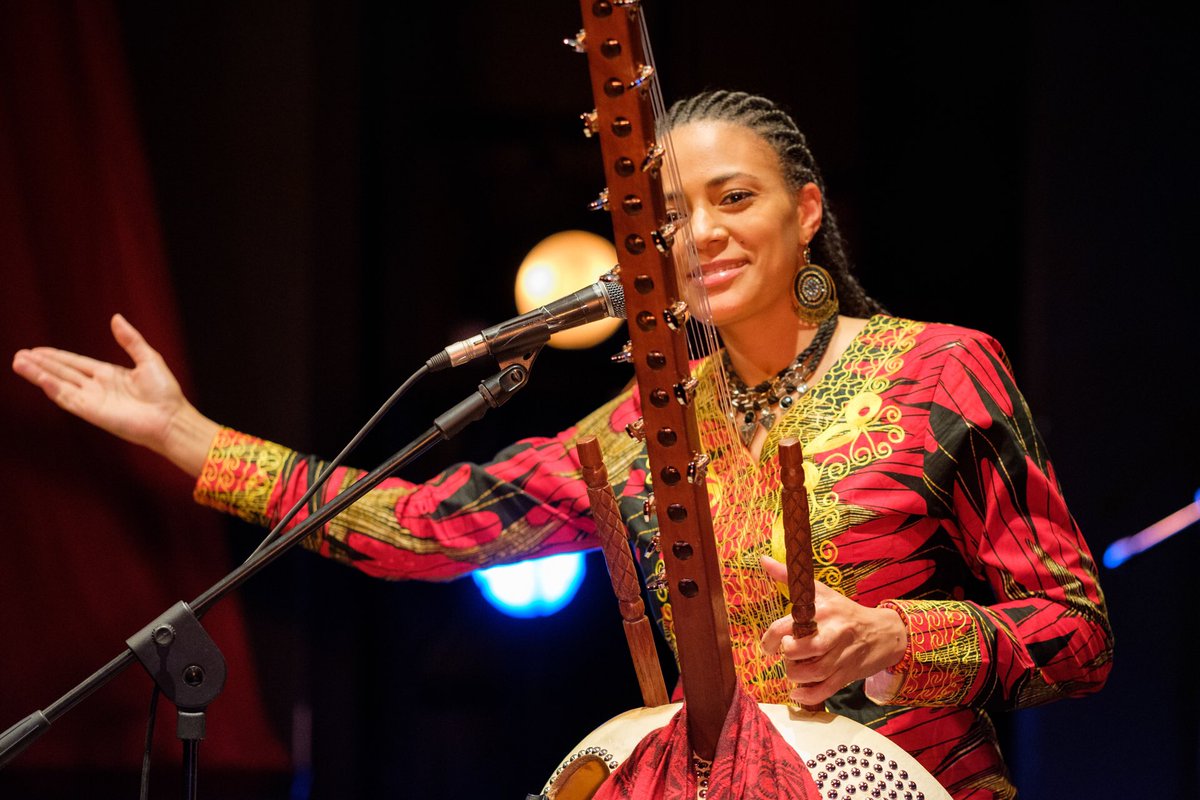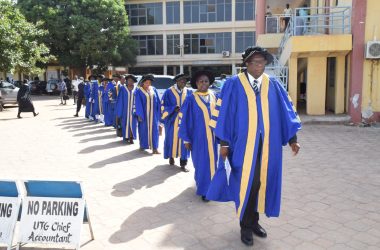
Manchester, England — When Sona Jobarteh, one of The Gambian’s most famous musicians, plucks the strings with his index finger and thumb, the airy sound of the centuries-old West African instrument Kora echoes. rice field.
Under the purple stage lights of the Manchester International Festival in July — her first performance since the beginning of the pandemic — Giovarte velvets the refreshing sound of Kora, a 21-string instrument that combines the qualities of a lute and harp. I added the voice of. .. She sang in Mandinka, a language spoken by one of the many ethnic groups in The Gambia, which rained down to an audience in northern England.
Just as her father and relatives have grown over generations, Giovarte is a griot — a musician or poet whose tradition is preserved throughout the family lineage. And in West Africa, griots play a much broader role. Not only as a master of Kora, but also as a historian, genealogist, mediator, teacher, and guardian of cultural history.
“Griots are a pillar of society, and people go for guidance, counsel, and wisdom,” said 37-year-old Giovarte.
Up to Jobarteh, Koramaster had another notable feature. They were always men. Traditionally, Kora’s performances have been passed down from father to son, but for many years Giovarte was the only child of her father. “No matter what I do, it’s always in a nasty box,” she said with a laugh.
Initially, she avoided the label of the first female Koramaster and preferred to value her ability over gender. “I hated it with passion,” she said. “I felt like no one was listening to me playing. All they do is observe what I am.”
However, her achievements inspired young female students, and she began to accept the position. “It’s just much bigger than me,” she said. “It’s about planting that inspirational seed in a girl.”
Kora was also the one that united her parents.
In 1982, a year before Giovarte was born, Galina Chester, an English mother who had never left England, flew to Senegal. She was Giovarte’s half-brother, British Nigerian, and now traveled with multiple sclerosis composer Tande Jegede, linking him to African heritage.
Picking up a piece of paper scribbled in the name of Koramaster, Chester crossed the desert to Gambia, where there was no airport at the time, and to Amaduban San Giovarte’s house. Advisor to the first president of The Gambia.
There, she met Koramaster’s son, Sanjari, an elementary school student. Sanjari became Giovarte’s father. “That’s how she met my father and how my story began,” said Giovarte.
Giovarte’s childhood spanned two worlds: Britain, where she was born, and Kembuje, the village of Gambian’s grandfather. There, she found a “cultural foundation”, surrounded by the warmth of an extended family.
Griot women are usually taught to sing, but her grandmother Kumna advised her to sit down with her grandfather and listen to Kora.
A few years ago, Giovarte’s mother shared a letter with her daughter, and Kumna predicted that the girl would be a griot and begged her to raise her pedigree.
“I wish she was alive to ask her what I was thinking,” said Giovarte. “She knew I was a girl. She knew it was unacceptable.”
Giovarte’s first Kora teacher was her half-brother Jegede, who began playing musical instruments at the age of three (Jegalte is a virtuoso in her own right, but not a griot from outside Giovarte. )
She later decided to pave the way for classical music. At the age of 14, she took a composition lesson at the Purcell School for Young Musician in the suburbs of London. Still, her first instrument remained around her. In the school library, Kora donated by Tande as a student was on display. Attracted by it, she adjusted and played it, and the school eventually gave it to her.
A year later, she entered the Royal College of Music, where she studied cello, harpsichord and piano. However, her personal musical heritage was not welcomed. One instructor dismissed Kora as “ethnic” and another instructor described the instrument as follows: this It’s not part of it. “
Three years after the education there, Giovarte deliberately failed in the annual evaluation of the piano and cello. “I was trembling,” she said. “I felt it was so wrong, but I just knew,’I can’t do this myself anymore.’”
The university declined to comment on this article.
Instead, Giovarte asked his father to formally teach him to play Kora and continued training with him for several years. He said to her, “I have a duty to give you mine,” she remembered.
Some families say the instrument dates back to the establishment of the griot tradition in the 13th-century Mandinka Empire. According to Lucy Durán, a music professor at SOAS University of London, Kora’s first written description by Scottish explorer Mungo Park appeared in 1797. The story of its popular origin is that it was stolen from Jin, which is mentioned in Islam as supernatural.
After the writer Alex Haley traced his ancestors to the village of The Gambia in the Pulitzer Prize-winning book “Roots,” the Mandinka and Griots received widespread interest. However, their ancient melodies traveled across the Atlantic Ocean centuries ago on a ship carrying enslaved Africans, transforming into the early American blues.
With an improvised oral tradition, Kora can take decades to master. “You learn with your ears, not your hands,” said Giovarte.
For years, she was reluctant to play in The Gambia, where a professional female Kora virtuoso had never been seen on stage. However, it was commendable that she made her stage debut with her family in 2011.
The release of her debut album that year was also a leap of faith. Giovarte sang in Mandinka instead of English, which was a more commercial success. “I thought,’This is it. I just put my life in the plug hole,” she recalled.
This album spread Giovarte’s music all over the world from America to New Zealand. And it brought her something much more meaningful than loyalty.
“Africans feel something when they see someone singing in their own language, dressing themselves, playing their music,” she said. rice field. “It’s a message not only to the Gambians, but to the entire African continent.”
Protecting her heritage is Giovarte’s passion, but she says her real purpose is to reform education in The Gambia. This is a broader mission that is consistent with her griot role.
In 2015, she opened the Gambian Academy in the coastal town of Carton. This is to prevent the brain drain of young people seeking a better outlook abroad. “I have to do that for the next generation,” she said. “To be successful in your society, you need the privilege of having a connection and title with Europe.”
With a curriculum centered around West African traditions, the school currently has 32 students, including a 14-year-old son Sidiki and a 9-year-old daughter Sadio. It also helped her carry on her family tradition, and on the Manchester stage Sidiki played xylophone-like balafon and sadio percussion.
They learn the griot repertoire not from their father, but from their mother, the guardian of the 7th century tradition.
Source: https://www.nytimes.com














